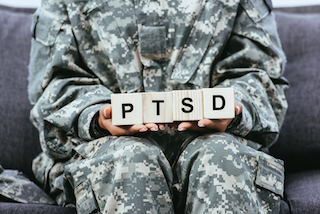 According to the U.S. Department of Veterans Affairs, 50 per cent, or five out of ten women experience trauma at some point in their lives and women are more likely than men to experience child abuse or sexual assault. In the general seven or eight out of 100 people will suffer from PTSD at some point and approximately eight million people have PTSD in a given year.
According to the U.S. Department of Veterans Affairs, 50 per cent, or five out of ten women experience trauma at some point in their lives and women are more likely than men to experience child abuse or sexual assault. In the general seven or eight out of 100 people will suffer from PTSD at some point and approximately eight million people have PTSD in a given year.
A new study published in the Archives of Psychiatric Nursing looked at proposing a conceptual model to understand the mutual regulations between two stress-related hormones (cortisol and oxytocin) as a sign of resilience, and the mutual dysregulations between these two hormones as a marker of vulnerability in women with post-traumatic stress disorder (PTSD).
“The neuroendocrine system, which produces cortisol, plays a significant role in stress responses,” study author Dr. Yang Li told us. “When stress occurs, cortisol is released and fights off stress. Oxytocin can help the cortisol levels return to the normal level. If these two hormones work well and interact well, women will be more likely to be resilient when traumatic events happen. Otherwise, if these two hormones do not function well and interact well, women will be more likely to develop PTSD after exposure to traumatic stress events. Childhood trauma is the root of problem, as it causes damage to the two stress-related systems.”
The model for the study was developed based on the concept of resilience and previous research findings. Not all women who have trauma history develop PTSD. When some traumatic events happen, some women remain resilient while others develop PTSD. The biological mechanism to explain this is still unclear. Given the mutual regulation between cortisol and oxytocin and their role in stress response, these two hormones may be able to explain this.
“We used a pre-existing small dataset to test the model,” Dr. Yang Li told us. “We found the highest levels of cortisol and oxytocin in women with the dissociative subtype of PTSD (feelings of detachment within the self and being unreal about the outside world) compared to women with PTSD and women with trauma history only.”
Dissociative PTSD affects a person’s memory, consciousness, identity and self-awareness. It can make a person feel disconnected from themselves and their surroundings. They may experience flashbacks to traumatic events as well an blank out for a certain amount of time.
The results of the current study were not surprising to researchers.
“The findings partially support our model,” Dr. Yang Li told us. “That is, cortisol and oxytocin systems did not function well among women with the dissociative subtype of PTSD. But because of the sample size, we were not able to detect the mutual dysregulations between these two hormones in relation to PTSD.”
The number of veterans who experience PTSD varies according to where they served. In Operation Iraqi Freedom and Enduring Freedom, between 11 and 20 per cent who served in those missions had PTSD in a given year. Sexual trauma in the military also happens. Twenty-three per cent of women in the military have reported sexual assault.
Dr. Yang Li said future studies with larger samples of women, repeated measures of cortisol and oxytocin, and measures of childhood trauma and PTSD are still needed to validate the model.
“We hope this model can help trauma researchers and psychotherapists better understand the causes of PTSD,” Dr. Yang Li told us, “and then help early diagnosis and better treatment of PTSD.”
Patricia Tomasi is a mom, maternal mental health advocate, journalist, and speaker. She writes regularly for the Huffington Post Canada, focusing primarily on maternal mental health after suffering from severe postpartum anxiety twice. You can find her Huffington Post biography here. Patricia is also a Patient Expert Advisor for the North American-based, Maternal Mental Health Research Collective and is the founder of the online peer support group - Facebook Postpartum Depression & Anxiety Support Group - with over 1500 members worldwide. Blog: www.patriciatomasiblog.wordpress.com
Email: tomasi.patricia@gmail.com